As the world becomes more digital, virtual consultation platforms have become invaluable assets to professionals in healthcare, therapy, coaching, and business consulting. They allow real-time communication (video, audio, and messaging) in a secure manner, which makes remote services more available and efficient. A doctor doing telehealth visits, a therapist doing virtual visitation, a business consultant giving advice to clients across the world; all these tools make operations efficient, cut down on overhead expenses, and give a better connection with the client.
The platforms chosen here are the top 10 most reliable platforms, which meet privacy regulations (e.g. HIPAA), are easy to use, and integrate with other systems. This list will be very beneficial to healthcare professionals, mental health providers, wellness coaches, and corporate consultants. The criteria used in its selection were based on security and compliance, video quality, scalability, integration capabilities, pricing flexibility, and the overall user experience. The appropriate platform can significantly improve service provision and keep secrecy and comfort in business relationships.
Criteria for Selecting the Best Virtual Consultation Platforms
The following are the criteria for choosing the best virtual consultation platforms in 2025:
1. HIPAA and data security compliance: The platform should comply with privacy and security regulations (such as HIPAA in the U.S.) to ensure that confidential data about clients or patients is safe.
2. Video and audio quality: Clear audio and high-resolution video are the key aspects of quality communication, particularly during healthcare or therapy sessions.
3. Ease of use: The interface must be user-friendly to both the providers and the clients and must need little configuration or IT skills.
4. Integration capabilities: Integration with EHR systems, payment processors, calendar applications, and CRM systems is also valuable for a smooth workflow.
5. Custom features for specific use cases: Depending on the profession (e.g., medical, coaching, legal), platforms should allow such features as waiting rooms, appointment scheduling, group sessions, or client notes.
6. Scalability and reliability: The software must scale efficiently to both the solo practice requirements as well as the large enterprise-level requirements without affecting performance.
7. Mobile and browser accessibility: Cross-device and cross-platform access through mobile applications and web browsers make it convenient for the users.
8. Affordability and pricing flexibility: Pricing plans must be according to the size of the business and amount of usage with free or tiered plans where feasible.
9. Support and training: Efficient customer service and user materials (such as help centers or onboarding guides) are essential to problem-solve and adapt.
10. Reputation and reviews: Platforms that boast high user ratings, case studies, or industry awards or recommendations usually indicate higher reliability and satisfaction.
List of Top 10 Virtual Consultation Platforms
Here’s a breakdown of the top 10 best virtual consultation platforms in 2025, including descriptions, features, pros and cons, pricing, and ideal users:
1. Zoom for Healthcare
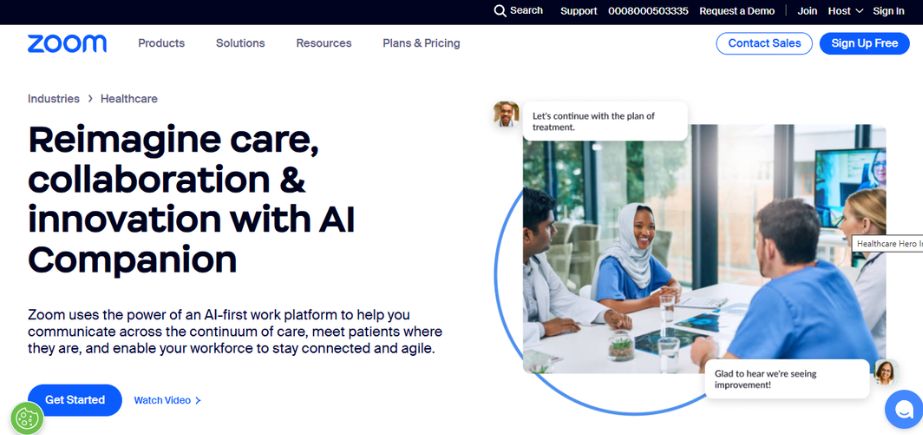
Zoom for Healthcare is a HIPAA-compliant edition of the well-known Zoom platform, optimized for telehealth and expert consultation. It allows high-quality and secure video conferencing with such features as a virtual waiting room, end-to-end encryption, and EHR integration. It is used by healthcare givers in remote diagnostics, treatment, and internal communication. It is compatible with a wide range of devices and is reliable, which makes it suitable for small practices and large hospitals alike. Although it is a more expensive option, it is scalable and easy to use, which makes it a default choice when it comes to safe virtual visits across the board, particularly in controlled healthcare settings.
Key Features:
- HIPAA and PIPEDA compliance
- HD video and audio
- Waiting room functionality
- Integration with EHR systems
- End-to-end encryption
Pros:
- Widely trusted and easy to use
- Scalable for small clinics to hospitals
Cons:
- Costly compared to basic Zoom
- Requires stable high-speed internet
Pricing:
₹1,147/month/user, billed annually
Who Should Use It?
Healthcare providers, hospitals, therapists, and business consultants needing secure video conferencing.
2. Doxy.me
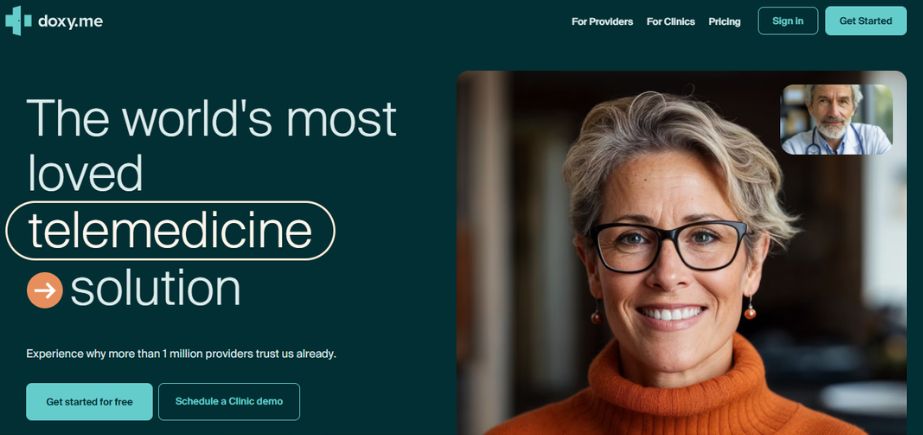
Doxy.me telemedicine platform is a browser-based system that provides an easy, HIPAA-compliant method for healthcare providers to meet with patients online. It does not need any downloads or installations and offers such features as virtual waiting rooms, custom branding, or end-to-end encryption. It is HIPAA compliant and has a friendly interface, which explains why it suits therapists, solo practitioners, and small clinics. The basic usage is free and enables video calls, whereas paying subscriptions unlock additional features. It does not have all the features of bigger platforms, but the ease of use and availability make Doxy.me a serious contender in the category of platforms that offer fast and cheap virtual consultations without being complicated to set up.
Key Features:
- No downloads required
- Free basic version
- Custom branding
- Virtual waiting rooms
- HIPAA compliance
Pros:
- User-friendly and no app needed
- Offers a free plan
Cons:
- Limited features in free version
- Video quality varies with bandwidth
Pricing:
Free basic; Professional from ₹1,990 per month
Who Should Use It?
Individual practitioners, therapists, and clinics needing quick, reliable telehealth solutions.
3. Teladoc Health
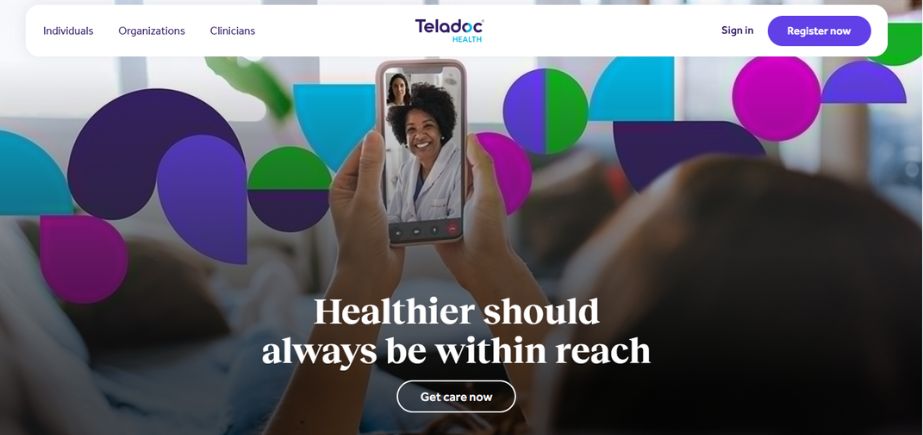
Teladoc Health is a major virtual care platform worldwide that provides around-the-clock access to general doctors, mental health, and chronic condition specialists. It consists of AI-powered symptom checkers, EHR, and mobile app support. It is best suited to large organizations and insurers, as it provides care at scale, being HIPAA compliant and consistent in user experience. Patients are able to talk to doctors at any time, usually at no extra cost as it is covered by insurance. Although it is not the most appropriate option to serve individual practitioners, Teladoc is the all-in-one platform used by employers, health systems, and insurance companies to provide full-service remote medical care.
Key Features:
- 24/7 access to care
- Integrated EHR and app
- AI symptom checker
- Multi-specialty support
- Global service reach
Pros:
- Established brand with broad reach
- Includes specialists and chronic care
Cons:
- Primarily patient-facing, not for private use
- Pricing varies widely by plan
Pricing:
Varies (insurance or subscription-based)
Who Should Use It?
Health systems, employers, and insurance providers offering telehealth at scale.
4. Amwell
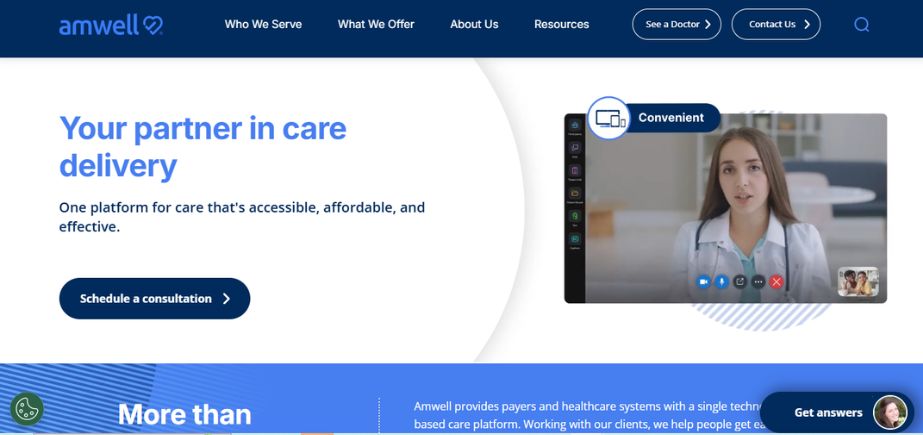
Amwell provides a full virtual care platform, consisting of urgent care, behavioral health, chronic care management, and specialist consultation. Hospitals, health systems, and payers use it, and it includes strong EHR integration including a fully branded telehealth experience. Amwell is HIPAA-compliant and can be accessed at any time of day and night on desktop and mobile devices. It is well suited to large-scale providers that require a bespoke, white-labeled telehealth platform. Its scalability, reliability, and range of care options make Amwell a leader in virtual health services at the enterprise level, although it may be overpowered by smaller clinics.
Key Features:
- EHR and insurance integration
- 24/7 availability
- Behavioral and chronic care
- Custom branded apps
- HIPAA compliant
Pros:
- Offers a wide range of care services
- Supports both web and mobile
Cons:
- High setup costs for providers
- Better suited for larger organizations
Pricing:
Custom pricing
Who Should Use It?
Hospitals, insurers, and large clinics offering full-spectrum virtual care.
5. SimplePractice
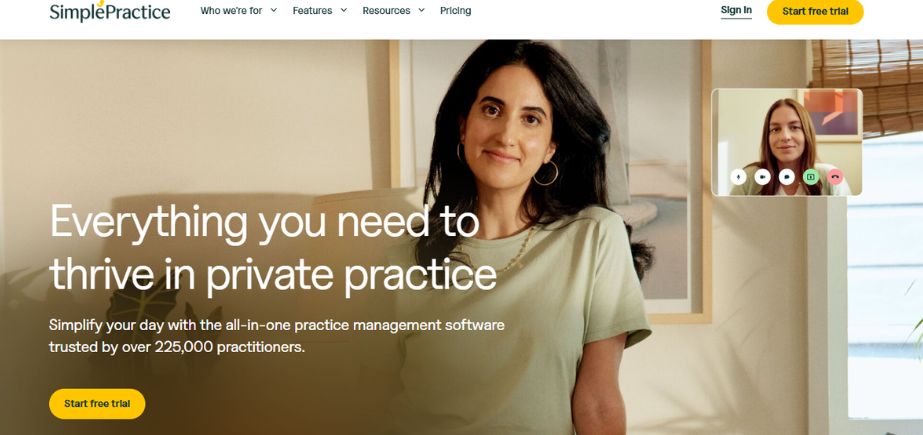
SimplePractice is a practice management platform and integrated telehealth that is commonly used by therapists, counselors, and wellness professionals. It provides video conferencing that is HIPAA-compliant, client intake forms, billing, appointment scheduling, and secure messaging all in a single system. It has a clear interface and a mobile application, which makes administrative work easier in solo or small-group practices. Although it was not designed to serve hospitals or general medical practices, it was made perfectly to serve mental health providers who are in need of a committed and dependable virtual consultation service. Specialization and low cost ensure that behavioral health professionals prefer it the most.
Key Features:
- Integrated telehealth
- Appointment scheduling
- Documentation and billing
- Secure client portal
- Mobile app access
Pros:
- All-in-one tool for therapists
- Customizable workflows
Cons:
- Not ideal for large organizations
- Learning curve for new users
Pricing:
Starts at $14.70/month
Who Should Use It?
Therapists, counselors, speech-language pathologists, and solo mental health practitioners.
6. Ensora Mental Health (Formerly, TheraNest)

Ensora Mental Health is a platform specialized in mental health and integrates the functionality of EHR, client management, and telehealth. It allows both individual and practice groups, videoconferencing, charges, progress notes, and appointment scheduling. Treatment-ready and HIPAA compliant, TheraNest is a HIPAA-compliant, behavioral health-optimized practice management platform specifically designed with psychologists, counselors, and social workers in mind. Its group session support and easy-to-use design serve individual practitioners to larger enterprise-level practices. Although it cannot be used in a wider medical context, Ensora Mental Health provides customizability and price-efficiency in the case of mental health practitioners who require an integrated practice and consultation system.
Key Features:
- Built-in video sessions
- Intake forms and e-signatures
- Group practice tools
- Billing and insurance claims
- Secure note-taking
Pros:
- Designed specifically for mental health
- Supports group practices
Cons:
- Limited outside mental health field
- Video quality varies with setup
Pricing:
Request a demo
Who Should Use It?
Mental health clinics, therapists, and social workers.
7. VSee
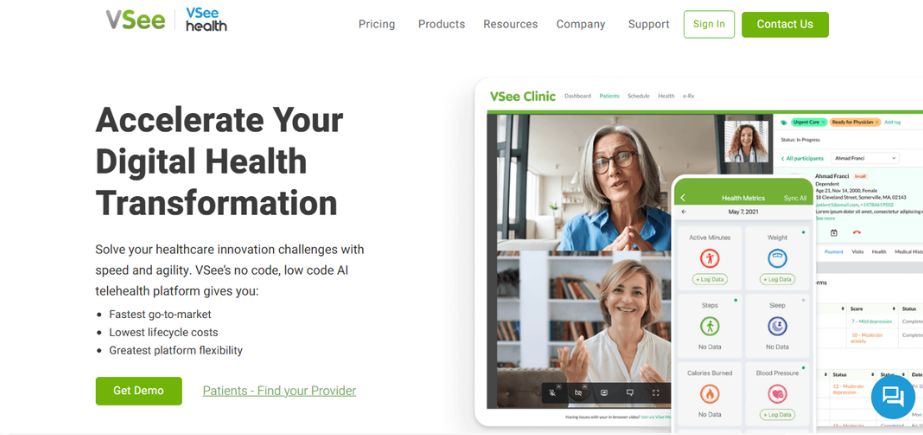
VSee is a safe telemedicine program that NASA, distant hospitals, and NGOs utilize in low-bandwidth conditions. It allows HIPAA-compliant video conferencing, integrations with medical devices, screen sharing, and flexible workflows. VSee is known to perform even in locations with low internet connectivity making it suitable for field clinics, rural health, and humanitarian missions. The developers also prefer it due to its powerful API and customizability. Its interface is not as modern as its competitors, but its efficiency on low resources and integration possibilities make it priceless in the delivery of telehealth in underserved or specialized settings.
Key Features:
- Low bandwidth optimized
- Custom workflow tools
- Medical device integration
- Secure file sharing
- API access for developers
Pros:
- Works well on low-speed networks
- Supports hardware integration
Cons:
- Interface less modern than others
- Best features in enterprise version
Pricing:
Free basic; Custom pricing for enterprise
Who Should Use It?
Clinics in rural areas, hospitals, and global NGOs needing reliable telehealth in low-bandwidth environments.
8. MDLIVE
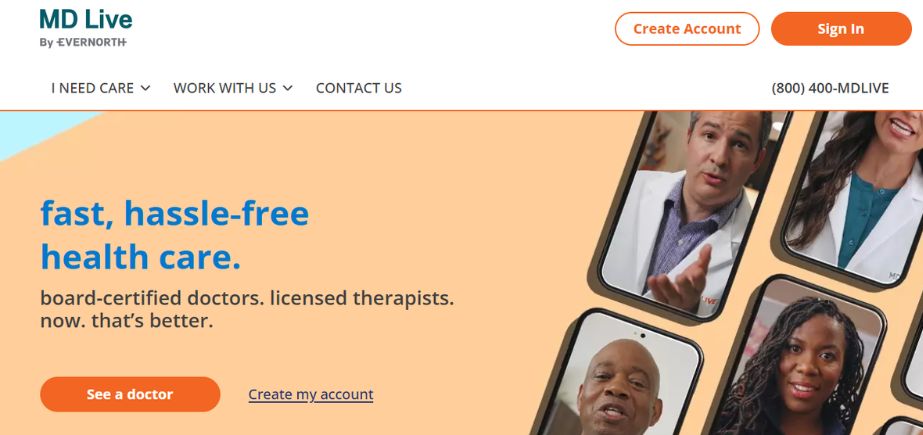
MDLIVE is a virtual access to board-certified physicians, therapists, and dermatologists when dealing with non-emergency health concerns. The patients will be able to consult 24/7 via mobile or web and receive prescriptions and follow-ups. It works with large insurance companies and employers to bring care to the user. Even though MDLIVE is not a provider practice management platform, it is an outstanding solution on the patient side. It would suit people who prefer on-demand care services without having to go to a clinic. Its fixed-price model and a wide network of specialists qualify it as a reliable service to get a quick and safe health consultation at home.
Key Features:
- 24/7 doctor access
- Prescription support
- Mental health services
- Mobile and web support
- HIPAA compliant
Pros:
- Covers many common medical concerns
- Works with insurance
Cons:
- Not designed for provider-facing use
- No practice management tools
Pricing:
Ranging between $0-299 depending on department
Who Should Use It?
Patients seeking quick, on-demand medical or behavioral care.
9. Healthie
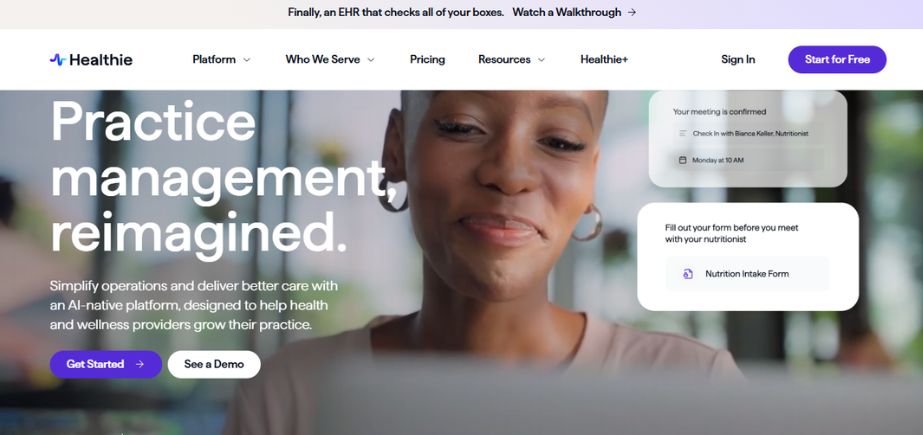
Healthie is an all-in-one platform designed to suit nutritionists, dietitians, and wellness professionals. It integrates telehealth video sessions, charting, scheduling, client journaling, billing, and messaging into a single, HIPAA-compliant platform. Healthie promotes client responsibility with meal tracking, progress notes, and HIPAA-compliant portals. It is perfect for health coaches and integrative care providers who require continuous engagement and customized tools of care. It is not meant to be used in cases of traditional medical clinics but excels in the areas of wellness, fitness, and preventative care businesses. It has an intuitive interface and industry-specific features that make it a potent tool for virtual health and lifestyle management.
Key Features:
- Telehealth video calls
- Secure messaging
- Client food journal tracking
- Charting and billing tools
- Mobile app for clients
Pros:
- Tailored for health and wellness pros
- Clean and client-friendly interface
Cons:
- Not suited for general medical clinics
- Somewhat pricey for new solo users
Pricing:
From $49/month
Who Should Use It?
Dietitians, nutrition coaches, fitness trainers, and wellness consultants.
10. Zocdoc
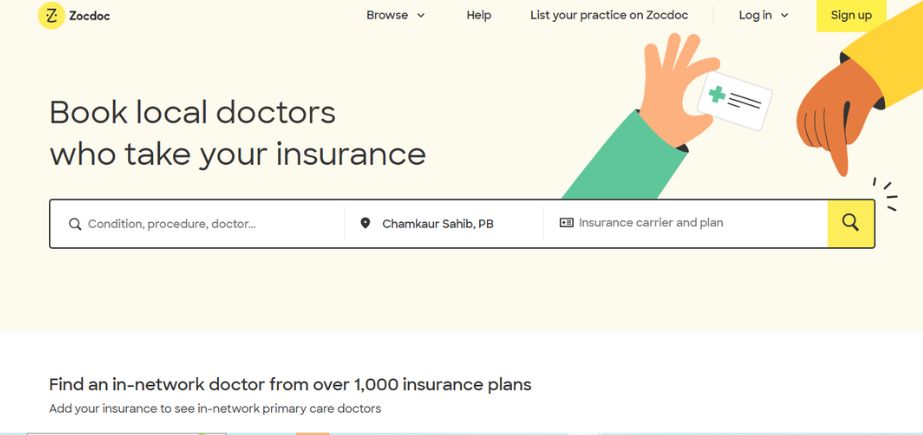
Zocdoc is a healthcare scheduling platform that allows virtual consultation scheduling with providers on its list. Patients may find doctors using specialty, insurance, and location searches and make virtual or in-person appointments. It is HIPAA compliant and exposes the providers in a popular directory. Although it lacks the capability of comprehensive practice management and EHR integration, it may be used extremely effectively in terms of finding new patients and managing the logistics of appointments. Zocdoc would suit small practices and independent providers that want to enhance their online presence and optimize the process of patient scheduling and consultation.
Key Features:
- Patient booking engine
- Verified provider profiles
- Online appointment scheduling
- Insurance filtering
- Virtual appointment capability
Pros:
- Strong marketing exposure for providers
- Easy-to-use patient interface
Cons:
- Service fees for providers
- Not a full EHR or telehealth suite
Pricing:
Pay-per-booking model
Who Should Use It?
Independent providers or small practices looking to attract more patients through an online directory.
Comparison Between Best Virtual Consultation Platforms
Here is a table comparing features, pricing, use cases, and official websites of the top virtual consultation platforms:
| Platform | Key Features | Pricing (if applicable) | Best For | Website |
| Zoom for Healthcare | HIPAA-compliant, HD video, EHR integration, waiting room, screen sharing | ₹1,147/month/user, billed annually | Healthcare providers, hospitals | https://zoom.us/healthcare |
| Doxy.me | Browser-based, no download, waiting rooms, secure chat, customizable branding | Free plan, paid plans from ₹1,990per month | Therapists, solo practices, clinics | https://doxy.me |
| Teladoc Health | 24/7 virtual care, multi-specialty support, mobile access, EHR connectivity | Subscription-based | Large healthcare organizations | https://teladochealth.com |
| Amwell | On-demand visits, mobile and web access, analytics dashboard, EHR sync | Custom enterprise pricing | Hospitals, health systems | https://amwell.com |
| SimplePractice | Scheduling, billing, secure video, client portal, documentation | Starts at $14.70/mo | Private practitioners, therapists | https://simplepractice.com |
| Ensora Mental Health | Group video sessions, billing tools, progress notes, appointment reminders | Request a demo | Mental health professionals | https://ensorahealth.com/ |
| VSee | Low bandwidth optimization, EMR integration, group calls, file sharing | Free basic plan, paid plans | Rural clinics, NGOs, telehealth teams | https://vsee.com |
| MDLIVE | 24/7 care, mobile-first experience, integrated pharmacy, behavioral health | Ranging between $0-299 depending on department | Employers, insurance companies | https://mdlive.com |
| Healthie | Video calls, practice management, client engagement tools, mobile app | Starts at $49/mo | Dietitians, coaches, wellness pros | https://gethealthie.com |
| Zocdoc | Online appointment booking, patient reviews, insurance filtering, reminders | Commission per appointment | Doctors, dentists, clinics | https://zocdoc.com |
Conclusion
The best virtual consultation platform will depend on your needs, industry, and budget. Zoom for Healthcare and Amwell are good options with scalable solutions that healthcare providers can use to find HIPAA-compliant integrations and features. Practitioners and individuals might want to use more accessible applications such as Doxy.me or SimplePractice due to their simplicity and customer-centeredness. Teladoc Health or MDLIVE can be used by organizations that need multi-specialty and enterprise-level infrastructure.
Healthie and TheraNest offer a good balance between consultation and practice management features to wellness professionals and coaches. VSee would best serve rural clinics since it is optimized to run on low bandwidth connections, whereas Zocdoc would best serve practitioners who want to make themselves more visible to patients by enabling online booking. The platforms differ in their strengths, and it is worth assessing according to compliance, usability, integrations, and cost-effectiveness to find the most beneficial one that will fit your virtual consultation purpose.
FAQs
1. What is a virtual consultation platform?
A virtual consultation platform is software that allows professionals to run remote visits through video, audio, or chat. It is widely applicable in medical care, counseling, coaching, legal counsel, and business counseling.
2. Are virtual consultation platforms HIPAA and safe?
A large number of these platforms are HIPAA-compliant and offer encryption of patient or client data. Before using the platform, it is worth checking its adherence to the appropriate data protection legislation.
3. Should clients install any software to participate in a session?
There are browser-based platforms that do not need any downloads and others that might need a mobile application or a desktop installation, depending on the provider.
4. Is it possible to connect virtual consultation platforms with other tools?
Yes, most of them allow connecting to tools, such as EHR systems, calendars, billing software, and CRMs to automate processes.
5. What is the price of virtual consultation platforms?
Prices Platform-dependent, features. There are some that have a free basic plan, whereas others have monthly subscriptions depending on usage, number of users, or premium features.

